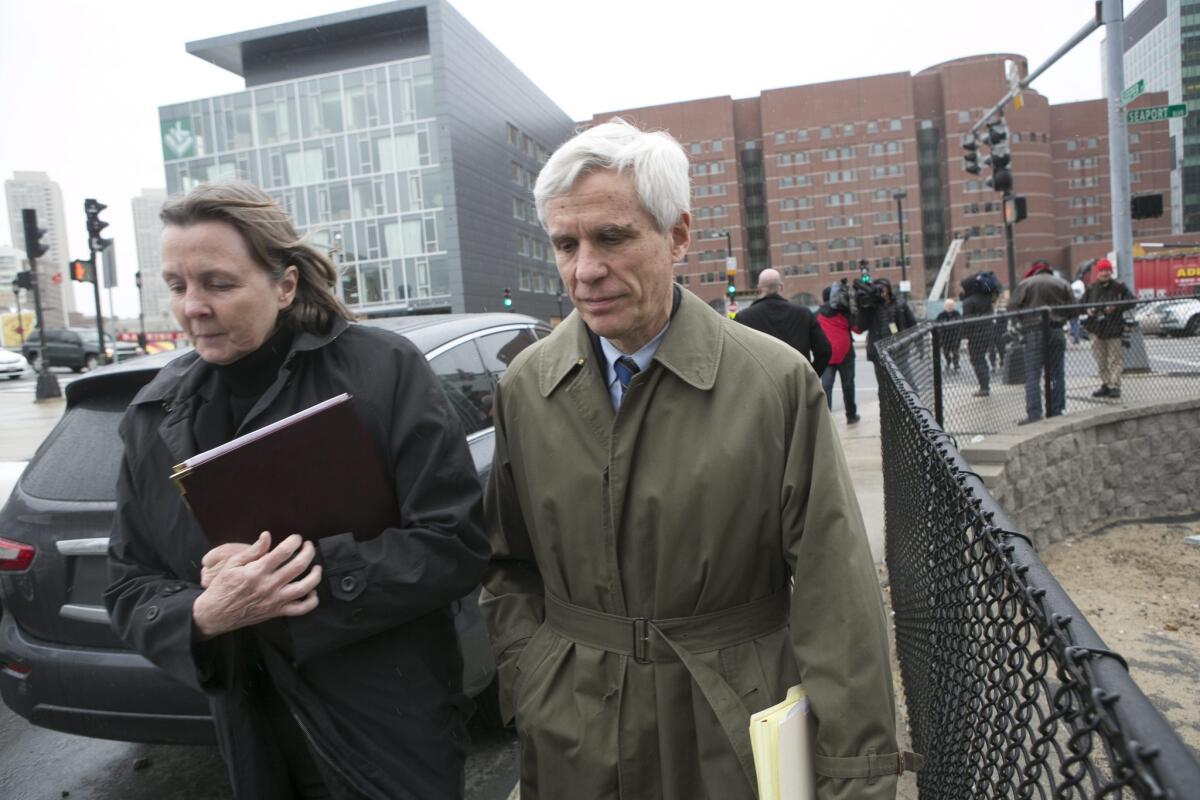Editorial: Boston Marathon bomber Dzhokhar Tsarnaev shouldn’t get death penalty

Dzhokhar Tsarnaev’s defense attorneys Judy Clarke and David Bruck leave the John Joseph Moakley Federal Courthouse on April 8.
- Share via
It was almost inevitable that the jury in the Boston Marathon bombing trial would reach the verdict it did. There was little doubt that Dzhokhar Tsarnaev was guilty of the heinous, despicable crimes for which he was charged; even his lawyer acknowledged his role. Two years ago Tsarnaev and his brother, Tamerlan, packed two pressure cookers with explosives, nails, metal shards and BBs. Then they detonated the bombs within seconds of each other near the race’s crowded finish line. The explosions killed three people and wounded 264 others, many of whom lost limbs or suffered other horrific, life-altering injuries.
It was the worst terrorist act in the United States since the Sept. 11, 2001, attacks, and it’s understandable that few Americans feel much pity for the young man in the dock. But early next week, when the same seven-woman, five-man jury that convicted Tsarnaev on Wednesday begins deliberating the young man’s fate, the decision-making will become even more difficult. Under federal law, Tsarnaev is eligible for the death penalty on 17 of the 30 crimes of which he was convicted. At the outset of the trial, the jurors all promised the judge that they would be able to sentence Tsarnaev to death if the evidence, and the crimes, warranted it.
Tsarnaev’s legal team will no doubt offer arguments for mitigation. He was only 19 when the bombings occurred. He has no prior criminal record. He was under the influence of his older brother.
But although those things may all be true, the real reason to spare Tsarnaev’s life is that no crime warrants the death penalty. The jury should reject capital punishment and sentence Tsarnaev to life in prison without possibility of parole because that is how a mature society acts. Not out of vengeance. Not out of passion. Killing another human being is immoral, whether by bomb or by lethal injection.
It was the desire for retribution that led this page to agree in 2001 that Timothy J. McVeigh, who murdered 168 people at the Alfred P. Murrah Federal Building in downtown Oklahoma City on April 19, 1995, deserved the death penalty. But that editorial was written out of passion, not justice, and we now regret what we wrote. It is in cases like these that a principled opposition to the death penalty is tested, and we should have understood that.
Tsarnaev deserves no sympathy. But he should not die at the hands of his government. To execute Tsarnaev would be to adopt the mentality of terrorists, who seek to sway the actions of others through violence. This country is — or at least should be — better than that.
Follow the Opinion section on Twitter @latimesopinion and Facebook
More to Read
Sign up for Essential California
The most important California stories and recommendations in your inbox every morning.
You may occasionally receive promotional content from the Los Angeles Times.










